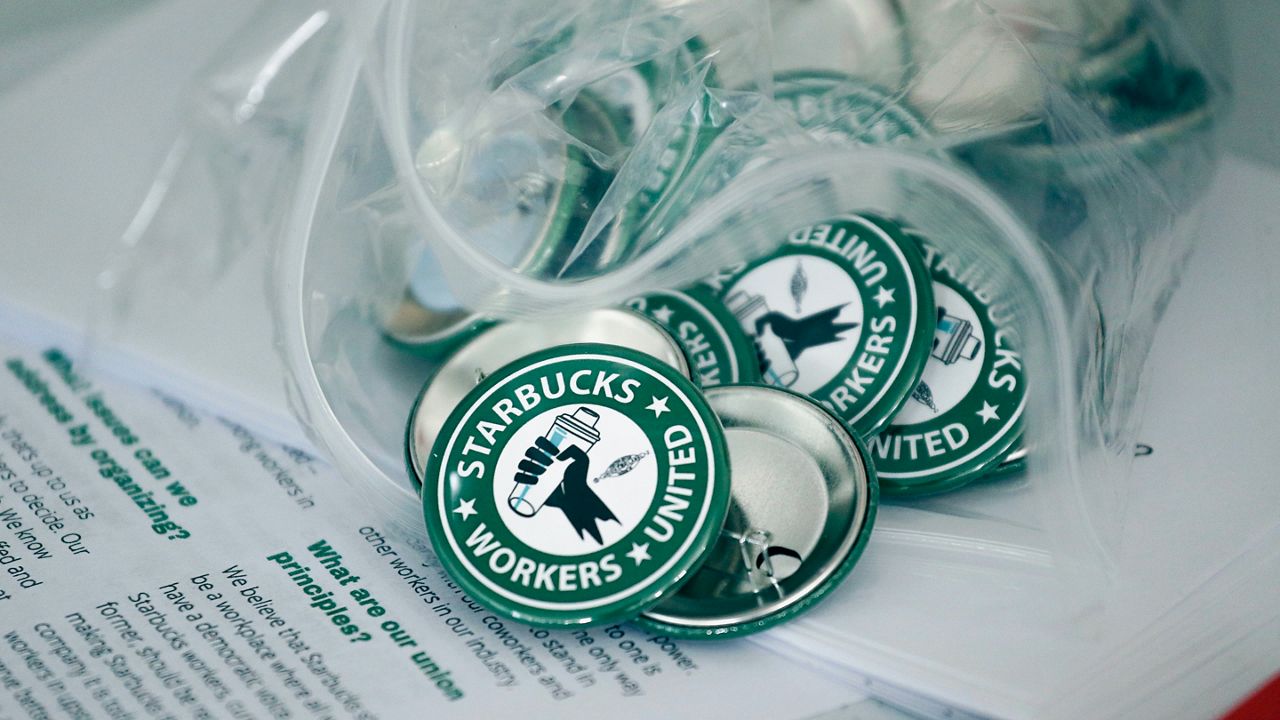The labor movement that started Starbucks employees' first union in Buffalo, New York, has now made it to the 50-year-old coffee giant's backyard — and that, one employee says, means the world to their movement.
“Bringing it home is huge, and I think that it’s bringing the conversation to a national level,” said Sydney Durkin, one of the organizing committee members seeking to organize the Starbucks location at Broadway and Denny Way in Seattle.
“It’s showing that this fight is real, and it’s only going to continue to grow — especially when it’s brought to where the company was founded," Durkin added.
Durkin and three other Starbucks employees (known as “partners” in the company’s vernacular) filed paperwork for a union election with the National Labor Relations Board on Dec. 20. Their petition was filed just weeks after the Elmwood Avenue store in Buffalo, New York, became the only unionized Starbucks in the United States.
A dozen shops have filed petitions to organize with Starbucks Workers United, under the umbrella of Workers United, which is itself affiliated with Service Employees International Union. Durkin and her comrades pulled their own effort together in a matter of days — they reached out to SWU on a Friday, and by Monday, they had an "overwhelming majority" of employees at their shop supporting a union election.
Starbucks’ organized labor history dates back to the 1980s, when Seattle-area employees voted to join the United Food and Commercial Workers labor union. That union decertified within a few years, not long after Howard Schultz took over the company in 1987. In the decades since, Starbucks successfully resisted every attempt at unionization across the United States — until Buffalo.
On Dec. 9, workers at a Buffalo-area Starbucks successfully voted to form a union, becoming the only store in the company’s chain of more than 9,000 U.S. locations to be a union shop. Two other elections within that market on that day have been challenged, and are awaiting certification. An organizer with Workers United said that "a movement is being formed, and it's pretty dramatic to watch it unfold."
Durkin noted that her experience at her store has been a good one, and that she does feel valued. As a company, Starbucks has long been held up as an example of what companies can do right with their employees. Employee benefits range from 401(k) retirement savings plans to paid time off to parental leave to education assistance.
“It’s a catch-22 to be advocating for more while acknowledging what it’s done for me personally,” she said. But their push, she said, is to ensure that workers have a say in every-day aspects of their job.
“Even setting aside that it’s often called unskilled labor, it is physically grueling. All manual labor is,” said Rachel Ybarra, who an organizer at the Seattle location alongside Durkin. Partners are on their feet throughout their shifts; long shifts are common, especially at understaffed stores; and paychecks don’t necessarily approach what it takes to achieve a living wage.
And even though some have positive experiences, personal stories vary from store to store across the country. Workers at a Mesa, Arizona shop recently alleged that the company fired an employee with leukemia who has been called a “whistleblower” against Starbucks’ “anti-union campaign.” The Mesa workers filed a petition for an election on Nov. 18, three days after their colleague was allegedly terminated in a phone call.
Reggie Borges, a Starbucks spokesperson, said that the employee had tendered her resignation — and that the company extended her last day to Dec. 1, so she could retain her health insurance through the end of the month.
The position of the company, according to an open letter by Rossann Williams, Starbucks’ executive vice president for North America, is that they do not want a union to be between employees and management — but that they will “bargain in good faith” with the employees of the unionized Buffalo store.
Though reasons for unionization, are varied across the spectrum of Starbucks’ 9,000 stores across the country, the Seattle shop is seeking to unionize largely to ensure that Starbucks lives up to its ideals. There’s a long-held story that the company’s corporate meetings include an empty seat at the table reserved for its employees, as a reminder that decisions should be made with them in mind.
“We need a seat at that table, to be able to express what we need in order to be fulfilled human beings,” Ybarra said.
If the initial Buffalo victory has been an inspiration for coffee shops across the country — including 52 workers at The Coffee Tree Roasters in Pittsburgh, who filed for a union election on Dec. 22, as well those workers at a Starbucks in Kentucky — the Seattle workers hope that they can help spur change on a larger scale.
“We have to start somewhere,” Ybarra said. “Starbucks is a large enough institution that, if we can change Starbucks, other people might look at that and say, well, if they can, we can too, right?”



